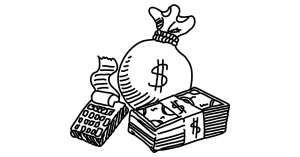In our modern, fast-paced world, it’s easy to fall into the trap of buying things that we don’t need. A consumer-driven society has led many of us to believe that more is better. However, when this attitude is left unchecked, it’s easy to overspend and quickly lose track of our finances.
Minimalism works to challenge the notion that owning more is a mark of success. By adopting a simpler, more focused manner of consuming and living, minimalists leave room for what really matters in life. Instead of seeking temporary satisfaction, a minimalist way of life can help you cut out unnecessary spending, and remind you of what brings you lasting joy.
Ironically, with so many ways of practicing minimalism, it can be a little overwhelming to start with. That’s why, in this article, we’ll be diving into the history of minimalism to find out exactly what it entails, and exploring the various ways minimalism can help you achieve financial and mental stability.
What is Minimalism?
Despite popular counterarguments, modern minimalism doesn’t mean getting rid of all your earthly possessions and living in an empty house with no personality. Instead, it simply entails making intentional choices regarding the things you buy and own and prioritizing meaning, memories, happiness, and experiences over material possessions.
The roots of minimalist living can be traced back to the mid-19th century. Philosophers Henry David Thoreau and Ralph Waldo Emerson pioneered the view that the best way to achieve enlightenment was through simple living. Though this wasn’t exactly minimalism as we know it today, it was the beginning of the Western belief that simplicity could lead to clarity.
Throughout the 20th century, minimalism was a distinct style in art and design. In the 1920s, the Bauhaus school used minimalism to combine beauty with functionality, and throughout the century many artists began to incorporate minimalism into writing, architecture, fashion and eventually, living.
Minimalism saw a huge boom in the 2000s as consumer culture reached an all-time high. Now, it’s not only seen as a way to realign yourself with what matters more than material possessions, but can counter ever-changing trends, and the fast-fashion and fast-food industries that have detrimental effects on our planet.
Living as a Minimalist
Let’s take a look at some of the main minimalist beliefs that you can incorporate into your purchasing habits and way of life. In general, there are four main tenets of minimalist living:
Sense of Purpose and Authenticity - Minimalism speaks to decluttering your life by owning things that have a definite purpose and serve you day-to-day. While that SodaStream was fun to use for a week, now it’s just sitting at the back of your kitchen cupboard collecting dust. Plus, do you really need subscriptions to 11 different streaming services? By ensuring that the things you buy have a lasting purpose, and relate to your wants and needs rather than trends, you can avoid unnecessary expenditure and clutter.
Mindful Consumption and Intentional Choices - Many of us are so overwhelmed with choices in our everyday lives, we simply buy what we’re told to buy. We need to stay healthy, so we purchase a myriad of unseasonal vegetables that end up going to waste. We want to fit in and look good, so we buy trendy fashion for cheap prices made in unsustainable ways, only to leave those clothes at the back of our wardrobes once they’re no longer ‘in’. Consuming mindfully and making intentional choices means you only buy what you need, and don’t get swept up in unsustainable practices.
Quality Over Quantity - As humans, it’s instinctual for us to over-consume. Way back in our history, having more food than we needed meant a better chance of survival in times of crisis. In the modern world, having more things is a sign of our financial success, which draws further success to us. However, overconsumption also leads to financial strain, increased stress, and has a myriad of negative effects on the environment. Opting for quality over quantity allows us to break free from societal pressure to over-consume, meaning we can instead focus on sustainable finances and mental attitudes.
Financial Freedom and Aligned Priorities - A big part of minimalist living is working out what matters to you in everyday life. For example, if you like to have a social household filled with friends, you’ll need more furniture and entertaining options than someone who prefers to see friends at a local restaurant. Or, if you’re practicing a certain hobby or working toward a potential career, you don’t need items that will distract you from these goals. In this way, minimalism can help you make conscious purchases that align with your desired way of life, preventing you from making unnecessary financial decisions that don’t benefit you in the long term.
The Science Behind Minimalist Living
Next, let’s explore the science behind these tenets of minimalist living, and how they can lead to a happier life both financially and spiritually.
- Reduced Stress
The North American Journal of Psychology found that individuals who work from home experience heightened levels of stress when surrounded by clutter. The more extraneous clutter a person had, the more likely it was that they would procrastinate and have trouble making decisions.
By embracing minimalist values, you’ll rid your home and workspace of things you don’t need, making maintaining a clean and ordered space so much simpler. This can lead to a focused, motivated mindset when completing challenges, and a general feeling of clarity and peace when you’re at home.
- Improved Experiences
Minimalism can remind you how much more valuable experiences and memories are than physical products. With reduced stress and a heightened appreciation for experiences, the quality of time you spend making memories with friends and family will also increase.
Countless scientific studies espouse the benefits of spending money and time doing things instead of buying things. The Journal of Personality and Social Psychology found that happiness from experiences, as well as being greater than that from purchasing material possessions, also lasted longer. The more expensive an experience, the more joy it brought to participants, whereas the more expensive an item, the less joy it brought.
- Increased Well-being
In an analysis of practicing minimalists and eudaimonic well-being, the International Journal of Applied Positive Psychology found that minimalists usually feel more competent in all environments. This is because they focus on solutions that don’t involve consumption, and are prepared to repair rather than replace. Minimalists were also found to have more life skills such as financial management, research skills, and self-control.
The combination of these factors means leading a minimalist lifestyle really does have a positive effect on overall well-being and quality of life. With less anxiety, more focus, and attention to problem-solving, adopting a minimalist lifestyle can give you a sense of control in our hectic world.
How Minimalism Can Benefit Your Finances
Now that we know how minimalism can affect your mental health and quality of life, let’s discuss its potential effect on your financials. Here are some of the ways minimalism can benefit your finances:
Reduced Spending
Since minimalism revolves around making intentional and functional purchases, you’ll likely find your spending is immediately reduced as you’re not buying so much. This attitude will also help you tell the difference between what you need and what you want. If you’re only buying what you need, you’re far less likely to make rash and impulsive purchases.
More Financial Awareness
Once you’ve begun to make intentional choices when it comes to your purchases and swap out material possessions for experiences, you’ll be far more in tune with your finances. Knowing exactly how much you have available to spend will make budgeting easier, and allow you to save money regularly.
Reduced Waste
Savethefood.com found that a four-person family loses around $1500 in wasted food every year. If you’re only buying what you need, chances are you’re going to use it all and get your money’s worth. Less waste means more money to spend on things that you’ll use.
Reduced Storage
Though shelving and storage are functional purchases, it’s what they store that’s less functional. Once you’ve removed excess possessions from your home, you’ll find you don’t need anywhere near as much storage. You can sell these cupboards, drawers, and wardrobes, or refashion them into other pieces.
Lower Energy Costs
If you’re running several unnecessary appliances on standby, this can take a toll on your energy bill. By removing rarely used gadgets from your life, you’ll be able to cut your electricity costs. Minimalism will also help you to be mindful of how much water and electricity you’re using every day. By taking shorter showers and switching lights off, you can lower your energy costs and save money.
Try Before You Buy
Since minimalism suggests choosing quality over quantity, when you make intentional purchases you’ll want to be sure that it’s money well spent. A great way to find out whether a product will be worth your money is by borrowing an equivalent from a friend or family member. Take recommendations and only buy what you know will serve you well. Additionally, don’t clutter up your home with books you’ll never read. Instead, get a library card and read for free!
Conclusion
By prioritizing what you need rather than what you want, making intentional purchases, being mindful of how you consume and consciously decluttering your life, you can begin to lead a minimalist lifestyle.
Minimalism can have profound effects on your financial life, as well as your mental well-being. More space in your home provides you with more freedom to take up hobbies or host friends. This also reduces your stress, especially if you work from home. Similarly, minimalism can make you aware of your spending habits, and encourage you to spend on experiences and things that really matter.
As well as mental well-being, by reducing purchases, encouraging repairs and recycling, reducing waste, and lowering your energy costs, minimalism can help you save money. With an increased awareness of your finances, you can treat yourself when you need a pick-me-up, without harming yourself, your space, or the planet.
Perhaps the best thing about minimalism is that you don’t have to dive in all at once. Decluttering your life is a long process filled with lessons, so take it slow. Once you start to see the benefits, you’ll feel more prepared to make bigger changes. Good luck!
Sources
- https://minimalism.co/articles/history-of-minimalism
- https://thetinylife.com/are-minimalists-happier/
- https://medium.com/better-advice/9-reasons-investing-in-experiences-will-make-you-happier-than-buyin-new-stuff
- https://barefootminimalists.com/how-minimalism-can-improve-your-finances/
- https://www.researchgate.net/publication/348136754_The_Impact_of_Office_Clutter_on_Remote_Working_I_Can't_Work_with_All_This_Stuff
- https://psycnet.apa.org/fulltext/2003-10055-017.pdf?auth_token=8ad30552b7b6560f79aa9f8fd474e0964945cdc0
- https://roomtothink.net/wp-content/uploads/2020/10/Lloyd_et_al-2020-International_Journal_of_Applied_Positive_Psychology-2.pdf
- https://www.tandfonline.com/doi/abs/10.1080/17439760.2021.1991450?src=&journalCode=rpos20
- savethefood.com





















Add comment